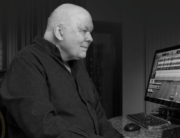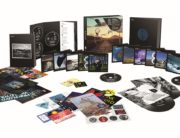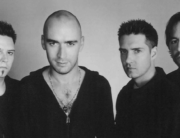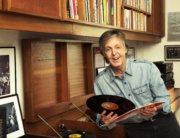BY MIKE METTLER – AUGUST 24, 2016
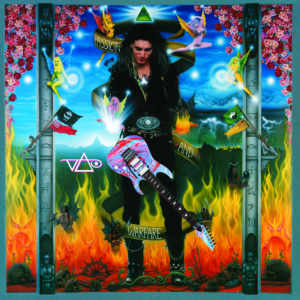 There are guitar gods, and then there’s Steve Vai. Vai catapulted the art of guitar playing into new realms the instant he became the designated “impossible guitar parts” player in Frank Zappa’s band while he was still a teenager. From there, he replaced Yngwie Malmsteen in Alcatrazz, was the devil’s chosen guitar player in the infamous guitar duel with Ralph Macchio’s character in 1986’s Crossroads, and helped David Lee Roth establish himself as a solo artist to be reckoned with on Eat ’Em and Smile, which came out 30 years ago this month.
There are guitar gods, and then there’s Steve Vai. Vai catapulted the art of guitar playing into new realms the instant he became the designated “impossible guitar parts” player in Frank Zappa’s band while he was still a teenager. From there, he replaced Yngwie Malmsteen in Alcatrazz, was the devil’s chosen guitar player in the infamous guitar duel with Ralph Macchio’s character in 1986’s Crossroads, and helped David Lee Roth establish himself as a solo artist to be reckoned with on Eat ’Em and Smile, which came out 30 years ago this month.
Now Vai is celebrating a milestone of his own — namely, the 25th anniversary of his highly influential breakthrough solo album Passion and Warfare, just released in a deluxe two-disc edition by Epic Legacy along with the bookend disc dubbed Modern Primitive, a collection of updated, never-finished works-in-progress from the era between his 1984 debut Flex-Able and Passion’s late-1990 release.
You can read all about the sonic choices for that combo release in my interview with Steve over on Digital Trends, but here, in a SoundBard exclusive, Vai and I discuss his views on surround sound, what Modern Primitive tracks would work best in 5.1, and the identity of a long-revered recording artist he’s only recently discovered for himself.
Mike Mettler: We were talking about the differences between mono and stereo, and how that played an important part of how we listened to The Beatles, depending on our personal preferences. That said, the music itself was so good to begin with, you could like it no matter what format you heard it in.
Steve Vai: And when stereo came out, a lot of people didn’t want stereo Beatles. They preferred the mono. I think [late Beatles producer] George Martin preferred the mono.
Mettler: I believe that’s right. Everything the band released had a mono mix, right up until Abbey Road (1969). Mono was their preferred listening and recording method.
Vai: Yeah — it’s thicker, you know?
Mettler: On the other side of things, have you given any thought to doing surround sound mixes of your own studio material at some point?
Vai: I have, but it’s a matter of time, and resources. I have a surround sound setup, but I’ve got this overview that if your 5.1 system is not setup correctly, you don’t “get it.” So I’d like to do more of it, but I can’t imagine my fans running out and buying a 5.1 mix.
Mettler: Well, you’ve got at least one of us who will.
Vai: (laughs) Oh, nice! I would love to do it — it’s just a matter of time.
 Mettler: For example, I’d love to hear the Modern Primitive stuff in 5.1, right from that synth guitar that starts “Bop.” It’s perfect for surround.
Mettler: For example, I’d love to hear the Modern Primitive stuff in 5.1, right from that synth guitar that starts “Bop.” It’s perfect for surround.
Vai: Yeah! That would be pretty cool! (chuckles) That would be pretty bizarre too. OK, well, I would love to do that. Now you’re inspiring me! All right — that’s Project 200.
Mettler: Project 200.1, you could call it.
Vai: (laughs) I could!
Mettler: The whole “Pink and Blow Over” movement at the end of the record — that just lends itself to a full, immersive experience. It’s your modern opera, in a way.
Vai: That would be spectacular, wouldn’t it — that “Part II” [subtitled “Mars Attack”], with [keyboardist] Tommy Mars doing those rich chord changes — that would be spectacular, yeah!
Mettler: It’s also a great way to end that album.
Vai: Thank you. Modern Primitive was a real exciting project, because I’d always planned on doing it. My first record was Flex-Able (1984), which was a very bizarre kind of record. I was just learning how to engineer and produce, and discovering things like what frequencies were; all that stuff. And then I put a band together and started to record more, and write a lot.
Mettler: This was The Classified era?
Vai: Yeah, it was The Classified, with Tommy Mars, [drummer] Chris Frazier, and [bassist] Stu Hamm. I put it on the shelf. I didn’t finish it, because I joined Alcatrazz, and then from there, I got a record deal with Capitol. I wanted to do all-new music, and that’s when I started working on Passion and Warfare [which was ultimately released on the Relativity label]. And then I met Dave Roth, and postponed things even more.
So I was always waiting to go back and finish some of the recordings I started, and then re-record some of the things I’d written during that period. And I did it. It was perfectly timed for the 25th anniversary of the release of Passion. It’s very interesting, because it’s sort of the missing link between very early Vai like Flex-Able and Passion and Warfare. Those records are so vastly different.
Mettler: I look at them as bookends of your ’80s individuality. You dedicated Modern Primitive to the memory of Frank Zappa, whom you started working with in 1978, when you were 18 years old. What can you say about Frank today?
Vai: At any point in your life, you can discover something that can change the quality of your life if you resonate with it. And I can tell you, if you discover Frank’s music, his vast catalog, his buried treasure — if it resonates with you, it will change the quality of your life.
I was listening to some of Frank’s music earlier today — a piece called “While You Were Art,” which is off of Jazz From Hell [Zappa’s Grammy-winning album from 1986]. Amazing.
Mettler: I have a feeling people will soon be doing that with Passion and Warfare and its Modern Primitive bookend.
Vai: People will be doing that throughout history — and it just happened to me, oddly enough. I know this sounds extraordinary, but I just discovered the music of Bob Dylan.
Mettler: Really? Wow. Well, it’s never too late to discover the greats.
Vai: I totally agree! What an incredible songwriter he is.




